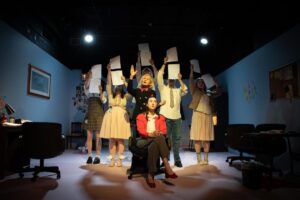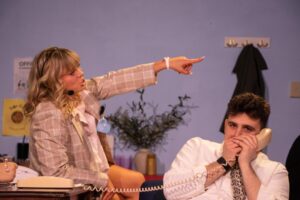
 ** Uneven and choppy, “Not Bitter Nor Sweet” will probably appeal to a younger crowd as compared to someone like myself. The title refers to an enterprise that’s somewhat of a cross between Ann Landers and Miss Lonelyhearts. It is a “love solutions” company where all of the characters answer the telephone and offer advice to clients on how to handle their romantic and sexual relationships. Based on an original script written by the Ensemble, the play is meant to be a snapshot of the company and its employees during the course of a nonspecific eight-hour workday. While the plan was apparently for various types of love to be explored in keeping with the Valentine’s Day theme, the story sadly falls short, and I kept looking at my watch especially towards the end of the ninety minutes.
** Uneven and choppy, “Not Bitter Nor Sweet” will probably appeal to a younger crowd as compared to someone like myself. The title refers to an enterprise that’s somewhat of a cross between Ann Landers and Miss Lonelyhearts. It is a “love solutions” company where all of the characters answer the telephone and offer advice to clients on how to handle their romantic and sexual relationships. Based on an original script written by the Ensemble, the play is meant to be a snapshot of the company and its employees during the course of a nonspecific eight-hour workday. While the plan was apparently for various types of love to be explored in keeping with the Valentine’s Day theme, the story sadly falls short, and I kept looking at my watch especially towards the end of the ninety minutes.
The plot is very thin. Allison (Allison Ristaino) has decided to leave her job and has arranged for her replacement Nealie (Nealie Tinlin) to take over at her desk. First thing in the morning, Nealie meets their boss (Allison Horvatin), who runs the agency as well as the reception area and phone tree. Once approved by her new supervisor, Nealie becomes a trainee, and we watch her learn the ropes about what to say to clients. In addition, the audience witnesses how phone calls are being passed along to individuals who work in different departments. Hannah (Hannah Loessberg) heads up the department having to do with long-term commitments (which she defines as relationships lasting three or more years). Crises (however defined) are handled by Allison and Jake (Jake Griffith), whereas Manuela (Manuela Álvarez) deals with those clients in first-time relationships. Martha (Martha Hansen) is the oldest and most experienced employee and generally deals with matters concerning sex. Situationships are handled by all. From the start of the workday through its end, we witness not only the advice being given out to clients but we also observe the social bonds among the workers despite their wide differences in personality.
personality.
While the underlying story lacks any sort of character development, it is, in fact, revelatory: The lighting occasionally shifts (courtesy of Amina Gilbert) from flat light during most office scenes to dim light with some spotlighting to indicate an extended present moment that focuses on each character’s frank and uninhibited thoughts and reflections. It is through the device of a soliloquy that we get some insight into their various personalities and styles of life—and we notice how their respective work lives are actually quite different from their private lives. In fact, the show is largely designed around sets of soliloquies, sometimes followed by a second character coming on the scene to ask questions, usually about personal experiences and those of their friends, families, and lovers. Now having said that, I found most of the characters to be relatively shallow and just a bit too self-centered that I didn’t really care about them or what they had to say. Too many things they discussed seemed rather inconsequential. In fact, there were a number of moments when I wondered why this particular dialogue was supposed to be of interest, and, then again, I decided that younger people could probably relate to this story more than I could.
Yet I found some parts of the play to be very heartfelt. For example, it was touching when Jake decided that he could reach his dying grandfather in the nursing home by having him listen to music. But I also wondered why Jake is the only male who works at this company. The narrative also touches upon gender roles and expectations—which are neatly explored by Allison—although much more could have been done with this theme in general. But the problem for much of this show is that we largely hear one-sided phone conversations, so we don’t really know which questions are being asked by the callers and how the advice is being received (with the exception of hearing one person crying over the phone at some point). While the play sports some funny lines, I think it might have been better off as a farce: For instance, employees might repeat the caller’s question to the group while they are kept on hold, and then ridiculous pieces of advice could have been played for a laugh (but, of course, not shared with the caller). The caller would then be given a sincere and serious answer. But comedy writing is tough, and this approach may seem rather insensitive…. But, as we know, serious answers to serious questions are not funny. And that’s the double-edged sword that the show takes on: How do you strike the right balance between a serious discussion about relationships and trying to be sweet and light at the same time? The play isn’t there just yet. In fact, the program states: “This entire show was written, directed, and shaped in only four weeks.” And while watching the production, it soon it became obvious that a rather innocuous and bland script needed further work and tweaking.
In addition to being actors in the show, Tinlin and Loessberg are its co-directors and its scenic designers. The set consists of robin’s egg blue walls and a pink floor plus lots of props to make the room look like a large office space. The props include four desks, one of which is shared by two or three people. We see chairs to match plus five corded phones. There’s a floor exercise machine (in pink, no less) that Hannah constantly uses, plus a large shredder. Different colors of Post-It Notes are featured and cutouts of hearts are all over the place. In fact, some of the best parts of the show have to do with the creative uses of paper and Post-It Notes. However, we should have seen several computers, perhaps one on each desk, and the employees should have referenced internet or intranet databases to provide some form of reference for the advice being given over the phone. Plus, computers would have been necessary to log in phone calls for recordkeeping purposes, especially if Not Bitter Nor Sweet Love Solutions was meant to be a real company with the aim of making money and paying salaries to its workers.
As it turns out, when these young people offer advice about love, sex, and romance to those over the telephone, most don’t really know much about the nature and scope of these relationships. What we discover is that each character is currently struggling through their own life challenges without necessarily having their act together. It is Martha (who is the first to come into the office and the last one to leave at night), who tends to be the voice of experience and reason. One important takeaway from seeing this show is that none of us is actually qualified to hand out advice unless we can truly walk in someone else’s shoes and have the wisdom to ask just the right questions.
Lazy Susan Theatre Company’s “Not Bitter Nor Sweet” is playing on the second floor of the Greenhouse Theater Center, 2257 N. Lincoln Avenue, in Chicago, through February 16, 2025.
 General admission tickets range from $16 – $31.50 (includes a $1.50 facility fee).
General admission tickets range from $16 – $31.50 (includes a $1.50 facility fee).
Be sure to use the Chicago Theatre Week discount code CTW25 for 50% off tickets!
Performance schedule:
Thursdays, Fridays, and Saturdays – 8:00 p.m.
Sundays – 2:30 p.m.
For more information and to purchase tickets, visit: https://ci.ovationtix.com/36644/production/1216484 or contact the box office at boxoffice@greenhousetheater.org.
Additional information is available at https://www.lazysusantheatreco.com/not-bitter-nor-sweet.
For general information about the Greenhouse Theater and to learn about their other offerings, go to: https://www.greenhousetheater.org/.
To see what others are saying, visit www.theatreinchicago.com, go to Review Round-Up and click at “Not Bitter Nor Sweet”.






More Stories
“Elvis Presley Was a Black Man Named Joe” reviewed by Julia W. Rath
“Guys and Dolls”
“Dummy in Diaspora”